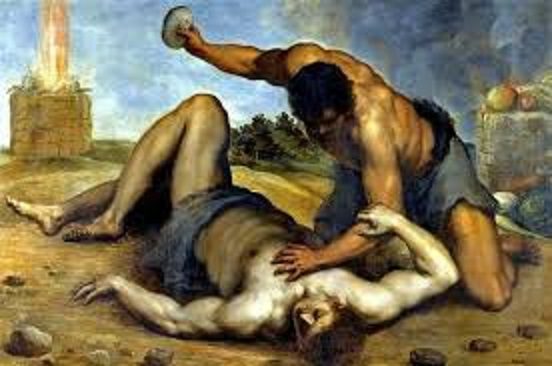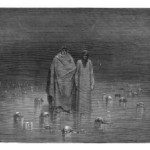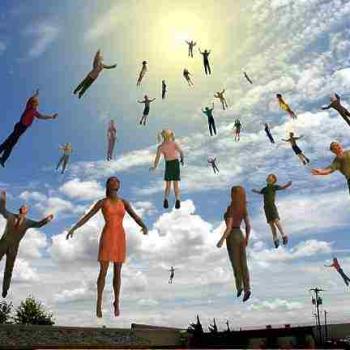Anthony Scaramucci described his relationship with Reince Priebus the other day by saying that “We are a little bit like brothers where we rough each other up once in a while, which is totally normal for brothers. Some brothers are like Cain and Abel.” In the book of Genesis, when asked by God about the whereabouts of Abel, Cain responded by asking a classic question: “Am I my brother’s keeper?” It would have been very helpful if God had answered Cain’s question: “Yes, as a matter of fact, you are.” Because a lot of people, especially in this country, seem to be confused about this.

Watching the Senate’s attempts to replace, replace and repeal, or maybe just tinker a bit with the Affordable Care Act over the past week has been great theater, especially for liberally minded folks such as I. Making promises is easy when you don’t expect to ever have to carry through on the promises—surprise! As the President asked many weeks ago when he found out that he couldn’t just say “Let Obamacare be repealed and replaced” and have it happen, “Who knew that health care was so complicated?” Just about everyone but you, Mr. President. I have to admit, of course, that the theater was much more entertaining when capped by the failure of Senate Republicans to pass even “skinny repeal” in the early hours of Friday morning. John M., Susan C., and Lisa M.—the beer is on me next time you are in Providence!
No single part of Obamacare has been more annoying to its critics than the “individual mandate”—the provision that requires everyone to have health insurance, whether they think they need it or not, and pay a penalty if they don’t get insured. The reason for the provision is simply that the cost of health care is controlled better if everyone is paying premiums, instead of them being paid just by those who need or think they might at some point need health care. If people who perceive themselves to be healthy are not required to have health insurance, the premiums for those who do have it and need it will go much higher, and the price of emergency room care for those who are uninsured when they, as they invariably will, need medical attention will be astronomical, a cost that everyone eventually pays for.
The pushback against the individual mandate is most often stated in terms of individual freedom—the choice of whether I purchase health care or choose to live dangerously without it is up to me, not someone else. Any attempt by the government to force me to purchase something I don’t want is a violation of my freedom and rights. Briefly put, why should I have to pay for something I don’t want? Even more succinctly, why should I ever have to do anything that I don’t want to do? In the case of health care, as someone on Fox News said in the aftermath of the failure to repeal the ACA on Friday morning, “Congratulations. The healthy people are paying for the sick people.” Well, at least someone on Fox understands what health insurance is.
I spend lot of time in the classroom with my students exploring the tension between individual freedom and the obligation we have as human beings to care about and for each other. Last semester, for instance, I began the first meeting of my “American Philosophy” class by asking the students to quickly list what popped into their head when I said the word “American.” The first words called out were “freedom,” “independent,” “self-reliant,” “autonomous,” and “individual.” Stereotypically, that’s what it means to be American. The quintessential American is, interestingly enough, captured succinctly in a very different context by the English Victorian poet William Ernest Henley in his poem “Invictus”: “I am the master of my fate, I am the captain of my soul.” Sounds good, but when considering the demands and duties of living in a society, it just ain’t true.
Moral philosophies and political parties can often be distinguished from each other quickly by asking “What do human beings owe to each other?” The spectrum of possible answers ranges from “Absolutely nothing” to “Absolutely everything”—the fact that I naturally lean strongly in the “everything” direction explains my own moral and political inclinations as clearly as any other single fact. I recently read an editorial that expressed the author’s exhaustion with having to explain why people should care about the welfare and health of people other than themselves and their family.
I don’t know how to explain to you that you should care about others
I agree with the author’s exasperation—“you are your brother’s (and sister’s) keeper” is such a baseline no-brainer, in my estimation, that I wonder about the full humanity of anyone who is confused as to why she or he should have to do that. Why should I care about people other than myself? Because I am a human being and so are they. Full stop.
That means, of course, that I will often be doing things in the interest of others that have no measurable benefit to me personally. This is the price of living in a functioning society with other human beings. Another English poet, John Donne, expressed this memorably.
No man is an island,
Entire of itself,
Every man is a piece of the continent,
A part of the main.
If a clod be washed away by the sea,
Europe is the less.
As well as if a promontory were.
As well as if a manor of thy friend’s
Or of thine own were:
Any man’s death diminishes me,
Because I am involved in mankind,
And therefore never send to know for whom the bell tolls;
It tolls for thee.
It is easy for people who profess the Christian faith to resonate with Donne’s sentiments; Jesus consistently tells us in the Gospels that our greatest concern should be not only for others, but specifically for those who are disenfranchised, not making it on their own, or in distress. In addressing the concerns of those in need, we are literally doing divine work and advancing the Kingdom of God. One has to do a lot of mental gymnastics to interpret the Gospels in any other way.
But one need not be a person of religious faith to find reasons to consider the needs of others to be at least as important as one’s own desires and needs. Our real individual mandate to care for each other was not created by the Affordable Care Act, nor would it have disappeared if Obamacare had been repealed. Each individual’s mandate to be concerned about the needs of others is rooted in our shared humanity. To be human is to be concerned about human beings, not just oneself. Because, as Donne writes, each of us is “involved in mankind,” each of us must recognize that the autonomous, individual, self-reliant, isolated American icon is a myth—and a dangerous one at that. We are each other’s keepers.

















